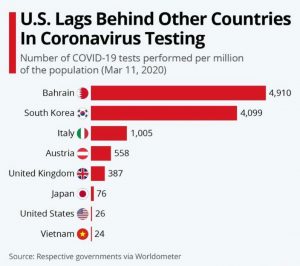Bangkok/Milan/Seoul – March 13, 2020 (travelindex.com) – Delays in testing set back the coronavirus response. Independent research projects in several countries concluded that early and wide testing makes containment of the virus much easier.
The small city-state of Singapore has shown the world how to respond to an unprecedented global health crisis like coronavirus by taking exemplary measures to (a) contain the virus, (b) handle efficiently the economic impact and (c) to minimize the psychological effect on its population.
Mr. Deepak Ohri, CEO of lebua hotels and resorts, a small hospitality private sector company in Bangkok (Thailand) took exceptional measures within its organization to retain all employees in their jobs and still guarantee the survival of the company. Lebua started “Super Friday”, weekly events for all its staff to keep them happy and motivated while assuring their psychological well-being.
Deepak said “these are extraordinary times requiring extraordinary measures but not measures to the disadvantage of employees”.
Mr. Ohri was recognized, in November 2019 as the World’s Leading Travel Personality by voters of the World Travel Awards, urges Governments, Local Authorities and Destination Marketing Organizations to do more and work together to fight and contain the deadly coronavirus.
Deepak said “we can’t stop the virus but if we all work together to coordinate our efforts and urge authorities to make swift decisions we can prevent the spread of this virus. China and South Korea have demonstrated that the coronavirus can be suppressed and controlled.”
And echoing Dr. Tedros, WHO Director-General, he said “let’s all look out for each other, because we’re in this together to do the right thing, the COVID-19 pandemic can still be contained if countries act fast.”
In Italy, millions are locked down and more than 1,000 people have died from the coronavirus. In South Korea, hit by the disease at about the same time, only a few thousand are quarantined and 67 people have died. As the virus courses through the world, the story of two outbreaks illustrates a coming problem for countries now grappling with an explosion in cases.
It’s impractical to test every potential patient, but unless the authorities can find a way to see how widespread infection is, their best answer is lockdown.
Italy started out testing widely, then narrowed the focus so that now, the authorities don’t have to process hundreds of thousands of tests. But there’s a trade-off: They can’t see what’s coming and are trying to curb the movements of the country’s entire population of 60 million people to contain the disease. Even Pope Francis, who has a cold and delivered his Sunday blessing over the internet from inside the Vatican, said he felt “caged in the library.”
Thousands of miles away in South Korea, authorities have a different response to a similar-sized outbreak. They are testing hundreds of thousands of people for infections and tracking potential carriers like detectives, using cell phone and satellite technology.
Both countries saw their first cases of the disease called COVID-19 in late January. South Korea has since reported 67 deaths out of nearly 8,000 confirmed cases, after testing more than 222,000 people. In contrast, Italy has had 1,016 deaths and identified more than 15,000 cases after carrying out more than 73,000 tests on an unspecified number of people.
Epidemiologists say it is not possible to compare the numbers directly. But some say the dramatically different outcomes point to an important insight: Aggressive and sustained testing is a powerful tool for fighting the virus.
Jeremy Konyndyk, a senior policy fellow at the Center for Global Development in Washington, said extensive testing can give countries a better picture of the extent of an outbreak. When testing in a country is limited, he said, the authorities have to take bolder actions to limit movement of people.
“I’m uncomfortable with enforced lockdown-type movement restrictions,” he said. “China did that, but China is able to do that. China has a population that will comply with that.”
The democracies of Italy and South Korea are useful case studies for countries such as America, which have had problems setting up testing systems and are weeks behind on the infection curve. So far, in Japan and the United States particularly, the full scale of the problem is not yet visible. Germany has not experienced significant testing constraints, but Chancellor Angela Merkel warned her people on Wednesday that since 60% to 70% of the populace is likely to be infected, the only option is containment.
South Korea, which has a slightly smaller population than Italy at about 50 million people, has around 29,000 people in self-quarantine. It has imposed lockdowns on some facilities and at least one apartment complex hit hardest by outbreaks. But so far no entire regions have been cut off.
Seoul says it is building on lessons learned from an outbreak of Middle East Respiratory Syndrome (MERS) in 2015 and working to make as much information available as possible to the public. It has embarked on a massive testing program, including people who have very mild illness, or perhaps don’t even have symptoms, but who may be able to infect others.
This includes enforcing a law that grants the government wide authority to access data: CCTV footage, GPS tracking data from phones and cars, credit card transactions, immigration entry information, and other personal details of people confirmed to have an infectious disease. The authorities can then make some of this public, so anyone who may have been exposed can get themselves – or their friends and family members – tested.
In addition to helping work out who to test, South Korea’s data-driven system helps hospitals manage their pipeline of cases. People found positive are placed in self-quarantine and monitored remotely through a smartphone app, or checked regularly in telephone calls, until a hospital bed becomes available. When a bed is available, an ambulance picks the person up and takes the patient to a hospital with air-sealed isolation rooms. All of this, including hospitalization, is free of charge.
South Korea’s response is not perfect. While more than 209,000 people have tested negative there, results are still pending on about 18,000 others – an information gap that means there are likely more cases in the pipeline. The rate of newly confirmed cases has dropped since a peak in mid-February, but the system’s greatest test may still be ahead as authorities try to track and contain new clusters. South Korea does not have enough protective masks – it has started rationing them – and it is trying to hire more trained staff to process tests and map cases.
And the approach comes at the cost of some privacy. South Korea’s system is an intrusive mandatory measure that depends on people surrendering what, for many in Europe and America, would be a fundamental right of privacy. Unlike China and the island-state of Singapore, which have used similar methods, South Korea is a large democracy with a population that is quick to protest policies it does not like.
“Disclosing information about patients always comes with privacy infringement issues,” said Choi Jaewook, a preventive medicine professor at Korea University and a senior official at the Korean Medical Association. Disclosures “should be strictly limited” to patients’ movements, and “it shouldn’t be about their age, their sex, or their employers.”
Traditional responses such as locking down affected areas and isolating patients can be only modestly effective, and may cause problems in open societies, says South Korea’s Deputy Minister for Health and Welfare Kim Gang-lip. In South Korea’s experience, he told reporters on Monday, lockdowns mean people participate less in tracing contacts they may have had. “Such an approach,” he said, “is close-minded, coercive, and inflexible.”
ITALY “AT THE LIMIT”
Italy and South Korea are more than 5,000 miles apart, but there are several similarities when it comes to coronavirus. Both countries’ main outbreaks were initially clustered in smaller cities or towns, rather than in a major metropolis – which meant the disease quickly threatened local health services. And both involved doctors who decided to ignore testing guidelines.
Italy’s epidemic kicked off last month. A local man with flu symptoms was diagnosed after he had told medical staff he had not been to China and discharged himself, said Massimo Lombardo, head of local hospital services in Lodi.
The diagnosis was only made after the 38-year-old, whose name has only been given as Mattia, returned to the hospital. Testing guidelines at the time said it was not necessary to test people who had no link to China or other affected areas. But an anaesthetist pushed the protocols and decided to go ahead and test for COVID-19 anyway, Lombardo said. Now, some experts in Italy believe Mattia may have been infected through Germany, rather than China.
Decisions about testing hinge partly on what can be done with people who test positive, at a time when the healthcare system is already under stress. In Italy at first, regional authorities tested widely and counted all positive results in the published total, even if people did not have symptoms.
Then, a few days after the patient known as Mattia was found to have COVID-19, Italy changed tack, only testing and announcing cases of people with symptoms. The authorities said this was the most effective use of resources: The risk of contagion seemed lower from patients with no symptoms, and limited tests help produce reliable results more quickly. The approach carried risks: People with no symptoms still can be infected and spread the virus.
On the other hand, the more you test the more you find, so testing in large numbers can put hospital systems under strain, said Massimo Antonelli, director of intensive care at the Fondazione Policlinico Universitario Agostino Gemelli IRCCS in Rome. Testing involves elaborate medical processes and follow-up. “The problem is actively searching for cases,” he said. “It means simply the numbers are big.”
Italy has a generally efficient health system, according to international studies. Its universal healthcare receives funding below the European Union average but is comparable with South Korea’s, at 8.9% of GDP against 7.3% in South Korea, according to the World Health Organization.
Now, that system has been knocked off balance. Staff are being brought into accident and emergency departments, holidays have been canceled and doctors say they are delaying non-urgent operations to free up intensive care beds.
Pier Luigi Viale, head of the infectious disease unit at Sant’ Orsola-Malpighi hospital in Bologna, is working around the clock – in three jobs. His hospital is handling multiple coronavirus cases. His doctors are shuttling to other hospitals and clinics in the area to lend their expertise and help out with cases. In addition, his doctors also have to deal with patients with other contagious diseases who are struggling to survive.
“If it drags on for weeks or months we’ll need more reinforcements,” he told Reuters.
Last week, the mayor of Castiglione d’Adda, a town of about 5,000 people in Lombardy’s “red zone” which was the first to be locked down, made an urgent online appeal for help. He said his small town had had to close its hospital and was left with one doctor to treat more than 100 coronavirus patients. Three of the town’s four doctors were sick or in self quarantine.
“Doctors and nurses are at the limit,” said a nurse from the hospital where Mattia was taken in. “If you have to manage people under artificial respiration you have to be watching them constantly, you can’t look after the new cases that come in.”
Studies so far suggest that every positive case of coronavirus can infect two other people, so local authorities in Lombardy have warned that the region’s hospitals face a serious crisis if the spread continues – not just for COVID-19 patients but also for others whose treatment has been delayed or disrupted. As the crisis spreads into Italy’s less prosperous south, the problems will be magnified.
Intensive care facilities face the most intense pressure. They require specialist staff and expensive equipment and are not set up for mass epidemics. In total, Italy has around 5,000 intensive care beds. In the winter months, some of these are already occupied by patients with respiratory problems. Lombardy and Veneto have just over 1,800 intensive care beds between public and private systems, only some of which can be set aside for COVID-19 patients.
The government has asked regional authorities to increase the number of intensive care places by 50% and to double the number of beds for respiratory and contagious diseases, while reorganizing staff rosters to ensure adequate staffing. Some 5,000 respirators have been acquired for intensive care stations, the first of which are due to arrive on Friday, deputy Economy Minister Laura Castelli said.
The region has already asked nursing institutes to allow students to bring forward their graduation to get more nurses into the system early. Pools of intensive care specialists and anaesthetists are to be set up, including staff from outside the worst affected regions.
To add to the burden, hospitals in Italy depend on medical personnel to try to trace the contacts that people who test positive have had with others. One doctor in Bologna, who asked not to be named, said he had spent a 12-hour day tracing people who had been in contact with just one positive patient, to ensure those who next need testing are found.
“You can do that if the number of cases remains two to three,” the doctor said. “But if they grow, something has to give. The system will implode if we continue to test everyone actively and then have to do all this.”
MAXIMUM POWER
In South Korea as in Italy, an early case of COVID-19 was identified when a medical officer followed their intuition, rather than the official guidelines, on testing.
The country’s first case was a 35-year-old Chinese woman who tested positive on Jan. 20. But the largest outbreak was detected after the 31st patient, a 61-year-old woman from South Korea’s southeastern city of Daegu, was diagnosed on Feb. 18.
Like the patient named Mattia in Italy, the woman had no known links to Wuhan, the Chinese province where the disease was first identified. And as in Italy, the doctors’ decision to recommend a test went against guidelines at the time to test people who had been to China or been in contact with a confirmed case, said Korea Medical Association’s Choi Jaewook.
“Patient 31,” as she became known, was a member of a secretive church which Deputy Minister for Health and Welfare Kim Gang-lip said has since linked to 61% of cases. Infections spread beyond the congregation after the funeral of a relative of the church’s founder was held at a nearby hospital, and there were several other smaller clusters around the country.
Once the church cluster was identified, South Korea opened around 50 drive-through testing facilities around the country.
In empty parking lots, medical staff in protective clothing lean into cars to check their passengers for fever or breathing difficulties, and if needed, collect samples. The process usually takes about 10 minutes, and people usually receive the results in a text reminding them to wash their hands regularly and wear face masks.
A total of 117 institutions in South Korea have equipment to conduct the tests, according to the Korea Centers for Disease Control and Prevention (KCDC). The numbers fluctuate daily, but an average of 12,000 is possible, and maximum capacity is 20,000 tests a day. The government pays for tests of people with symptoms, if referred by a doctor. Otherwise, people who want to be tested can pay up to 170,000 won ($140), said an official at a company called Seegene Inc, which supplies 80% of the country’s kits and says it can test 96 samples at once.
There are also 130 quarantine officers like Kim Jeong-hwan, who focus on minute details to track potential patients. The 28-year-old public health doctor spends his whole working days remotely checking up on people who have tested positive for COVID-19, the disease caused by the virus.
Kim, who is doing military service, is one of a small army of quarantine officers who track the movements of any potential carriers of the disease by phone, app or the signals sent by cell phones or the black boxes in automobiles. Their goal: To trace all the contacts people may have had, so they too can be tested.
“I haven’t seen anyone telling bad lies,” Kim said. “But lots of people generally don’t remember exactly what they did.”
Underlining their determination, quarantine officers told Reuters they located five cases after a worker in a small town caught the virus and went to work in a “coin karaoke,” a bar where a machine lets people sing a few songs for a dollar. At first, the woman, who was showing symptoms, did not tell the officers where she worked, local officials told Reuters. But they put the puzzle together after questioning her acquaintances and obtaining GPS locations on her mobile device.
“Now, quarantine officers have maximum power and authority,” said Kim Jun-geun, an official at Changnyeong County who collects information from quarantine officers.
South Korea’s government also uses location data to customize mass messages sent to cellphones, notifying every resident when and where a nearby case is confirmed.
Lee Hee-young, a preventative medicine expert who is also running the coronavirus response team in South Korea’s Gyeonggi province, said South Korea has gone some of the way after MERS to increase its infrastructure to respond to infectious diseases. But she said only 30% of the changes the country needs have happened. For instance, she said, maintaining a trained workforce and up-to-date infrastructure at smaller hospitals isn’t easy.
“Until we fix this,” Lee said, “explosions like this can keep blowing up anywhere.”
The world will be a better place than what we are experiencing now if we all learn from Governments like Singapore, South Korea or the Kingdom of Bahrain and from leading private companies like lebua hotels & resorts, BTS Thailand, Changi Airport Singapore and Singapore Airlines.
Published first by Reuters as Special Report at />
Reporting for Reuters by Emilio Parodi, Stephen Jewkes, Angelo Amante, Sangmi Cha and Ju-min Park; Additional reporting by James Mackenzie in Milan and Josh Smith in Seoul, Julie Steenhuysen in New York; Edited by Sara Ledwith and Jason Szep.
Edited by the editorial team at TravelCommunication.net for the Bangkok section.











